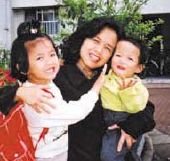PhD Student
Graduate School of
Dental Science

|
Ika Dewi Ana PhD Student Graduate School of Dental Science |
 |
It might be a little difficult to describe the feelings of those students who are studying here without any scholarships. Life in Japan is hard and very expensive. But why is it that the number of foreign students without any scholarships in Fukuoka is increasing dramatically, and why is it that the national budget is not enough to cover their tuition fee exemptions? On the other hand, it is also interesting to investigate the reasons why they are still willing to study here, and how they are trying to survive.
"In fact, I am not sure about this. I have to take the risk of living a hard life. But I believe I can finish the doctor course if I work hard and have the support of my family and friends," said Zhang Lei, a first year PhD student from China, when answering the question about the future of his study. He came to Japan in October 2001 and has never had a scholarship. Nasreen Banu, mother of an elementary school boy from Bangladesh, is determined to achieve her objective of earning a PhD degree for the following reasons, " Japan is a country with highly-skilled professionals and I dream of getting a higher education in the medical field. So I think my dream will come true if I can finish my higher education here in Japan." Nasreen was getting a Monbusho Grant from January 1996 to March 2001, but the grant term was over by April 2001. Since then she has become a private student. She is now in the final year of her PhD course in the Department of Molecular Immunology in the Graduate Scho ol of Medical Science at Kyushu University.
Sharing knowledge and happiness
with Japanese friends.A different story is presented by Sumbogo Murti of Indonesia, who lives with his wife and two children and is presently studying advanced chemical processes in the Kasuga area. "Frankly speaking, it was a very difficult time for me, and I had to decide whether to continue my studies or not. It was only because of the support from my wife that I finally made the right decision," he said. He completed his undergraduate studies in Saitama University, and then had the opportunity to continue his study for a master's degree with a STAID scholarship (Science, Technology, and Industrial Development Scholarship) from the Government of the Republic of Indonesia. The problems came after completing his master's degree. Even though the scholarship term had ended, Sumbogo really wanted to continue his studies. "My family alone had to cover all our expenditures with only 75,000 yen a month. I was getting some money from one institution which cooperates with my laboratory and by distributing newsp apers every morning," he said. However, his family survived because they limited all their expenses. "We got a discount for house rent, and we limited telephone calls and other unnecessary expenditures," he added.
Playing traditional instrument in front of
Japanese friends and other students.The way students without scholarships enter Japan is also interesting. This might not be a problem for Sumbogo and Nasreen, because when they came here they got scholarship grants which made it easier for them to get visas and complete other entry procedures. It was rather different for Zhang Lei. "I came to Japan with the help of a Japanese professor who knew the director of my department in China. He is a very kind old man. After I came to Fukuoka, he also helped me a lot in my everyday life," said Zhang Lei who was doing his research at the Dental Materials Laboratory of Fukuoka Dental College. His professor in Fukuoka Dental College (which is a private college) advised him to move to Kyushu University to reduce his education expenditure. This is because the tuition costs of a national university are much lower than that of private colleges. How are they doing now? Zhang Lei mostly spends his time in the laboratory. In his spare time, he makes himself busy by doing part-time jobs and chats with friends. Meanwhile Nasreen told us, "Fortunately my husband received a post doctoral fellowship soon after my scholarship term was over. He is now in the National Institute of Health Science in Tokyo. Now we can manage our expenses from that source. My son started attending elementary school." Best of all, Sumbogo got a Monbusho Scholarship after he survived a year of hardship!
For those of us who are studying here with monthly scholarships, we are lucky, so let us do our best and enjoy our time to learn as much as we can. While for those who are studying here without any scholarships, let the respondents experiences serve as an inspiration. They are only three of the many foreign students who are trying to fulfill their dreams, no matter how difficult it may be. As the saying goes," If there's a will, there's a way."
Please send us your comments for the improvement of this magazine or if you are interested in writing an article for us, e-mail us at: koho@jimu.kyushu-u.ac.jp